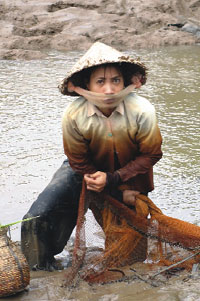Gender in fisheries
 Gender
equity in fisheries is one of the key social issues addressed
by the Fisheries Programme. Communicating information on gender-related
issues and supporting gender networks are important are aspects
its work.
Gender
equity in fisheries is one of the key social issues addressed
by the Fisheries Programme. Communicating information on gender-related
issues and supporting gender networks are important are aspects
its work.
Communications
In August 2004, the FAO invited the Fisheries Programme to participate at an international conference on policies and programmes for advancement of rural women. The Programme gave a presentation on rural women's access and rights to natural resources, such as water, fish and fisheries. Work by members of local management committees (comprising both women and men) formed the basis of the presentation. They also attended the conference together with their Fisheries Programme counterparts.
The presentation showed that women play a more important in the management of aquatic and other resources than hitherto thought, both in aquaculture and capture fisheries. This is because women have access to other types of resources, such as capital and technology, needed to exploit their particular fishery.
Yet, there are some factors that still impede women's full access to benefits from natural resources. These include increasing demands on women's time and labour, unequal information and knowledge, and the existence of fish marketing arrangements that deny them a significant part of the proceeds from fisheries. These may prevent some women playing a full role in developing and strengthening management institutions. Nevertheless, women's participation in management decision-making is emerging and, besides an increase in production, major benefits have been an increased self-confidence and feeling of citizenship.
In November 2005, the Fisheries Programme participated at the Global Forum on Gender in Fisheries, held during the seventh Asian Fisheries Forum in Penang, Malaysia. The topic of their presentation was gender mainstreaming in the MRC Fisheries Programme.
The presentation reviewed the various strategic areas and entry points developed by Fisheries Programme for its approach to gender and women in fisheries, such as:
- Considering gender in programme formulation and organisation.
- Examining gender roles and opportunities in fisheries, with a view to dealing with gender and women-related issues in an adequate way, including in the dissemination and communication of programme results.
- Addressing women's practical and strategic concerns and priorities.
- Communicating and networking gender and women in fisheries, in particular through support to the regional Network for Promotion of Gender in Fisheries (NGF) and its national chapters.
A major breakthrough for the Network for Promotion of Gender in Fisheries has been its commissioning to undertake a study for the Technical Advisory Body on Fisheries Management (TAB). The TAB gives a lot of importance to this issue, which is one of the 'regional issues' of fisheries management in the Lower Mekong Basin. This study will allow the TAB to develop a better understanding of gender issues in fisheries management and development.
Some work has already been done in the region on this issue and the study would primarily aim to pull this information together and identify ways in which the TAB can most effectively contribute to developments in this area.
The Network for the Promotion of Gender in Fisheries (NGF) has been struggling over recent years with two problems: a lack of clarity within the Network itself on what promotion of gender in fisheries really means; and unsuccessful attempts to get donor support for projects in the area of promotion of gender in fisheries. The involvement of NGF in this study will contribute to creating this clarity, as well as providing the first opportunity for NGF to undertake a project collectively, that is as a network, as opposed to the involvement of individuals who happen to be network members. Preparatory work for this study was undertaken in all four riparian countries during national workshops, and a final joint proposal developed. The TAB has recently sub-contracted the study to the NGF, and study implementation is now underway.
Choose a newsletter: